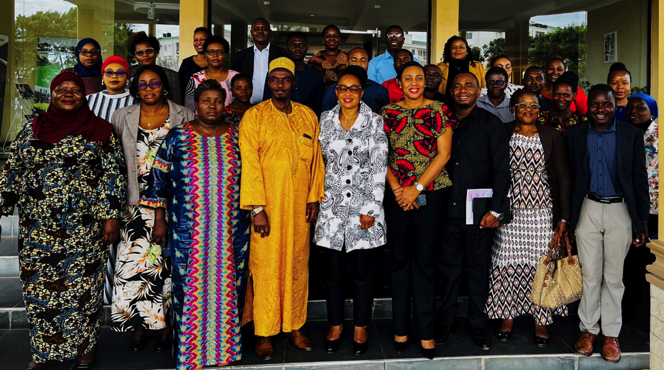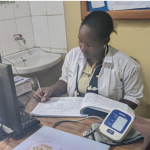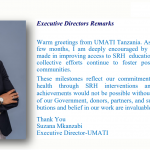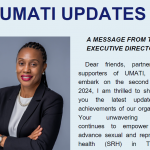Written by:
Richard Ryaganda – Communications Lead
In the quest to ensure accessible sexual reproductive health youth friendly services across the country, Chama cha Uzazi na Malezi Bora Tanzania (UMATI), recently convened 20 members of parliaments from the United Republic of Tanzania National Assembly. These members of parliament are also champions on sexual reproductive health issues. The need for this important meeting came at the right time when UMATI had just finalized a health budget analysis for the past three financial years.
UMATI Executive Director Ms. Suzana Mkanzabi had the honor of opening this important advocacy meeting with members of parliament by briefly taking them through the 60 years plus journey. And how UMATI have played the role in transitioning the family planning sector to now sexual reproductive health in Tanzania over the years. During her welcoming remarks she said” Our focus has mainly been on the youth because we believe that the youth are the future of the nation. As seen in the statistics, they carry more ¾ of our population. We pride ourselves in provision of SRH education and information through our interventions across the country and also services via our clinics and supporting government facilities”.
The assessment mainly focused on identifying youth related issues nationally and narrowed down to two districts of Mbozi in Songwe region and Kilosa in Morogoro region respectively. Delivering the findings of the assessment during this convening, Kuki Tarimo, a consultant who led the assessment mentioned that “In doing this assessment, we have observed that, budget allocation for youth is planned. However, it is not necessarily used in activities that can address youth-focused challenges.
Kuki Tarimo continues with an example from Mbozi districts where “youth have complained of their disinvolvement in the meetings that decides on budget issues due to guidelines not specifically mentioning the need for youth involvement in such decision-making levels. Scanning through the budget, we have noted the increase of the overall health budget. Also, the budget to councils have continued to increase. Although in areas where we were looking into which are key for allocations on youth such as reproductive child health, social welfare and non-communicable diseases where there are adolescent youth friendly services, which is one of the nation’s priorities there is a budget but it is slightly decreasing.
The decreasing of the budget on these areas in the council level has a direct impact on funds allocated specifically for young people and therefore we have advised the government to look at this as a priority which will help in increasing the fund for youth in Sexual Reproductive Health.”
Youth Representatives opinions
Jacob Mwashambwa, a youth champion from Mbozi said, there is an importance to consider special time for youth friendly services at the facilities because during the weekends for instance is when youth are available for the services. Unfortunately, the available services are only on emergency cases which denies young people the right to friendly services as they can not access services during the week with their elders.
Jacob pointed out that modern contraceptives such as female condoms are available, however usage is limited due to lack of information on the use. And therefore, to increase uptake, community members should be educated about the usage of this method.
Reactions from the members of parliament on the assessment
Members of parliament commended UMATI on the initiative to look into the budget and specifically the youth friendly services. Among contributions on the findings was regarding the need for parents and guardians to be capacitated on discussing SRH with their adolescents and youth at home. Understanding that the situation of the world we are currently living in is different from the past 20 years because as it stands, the traditions and cultural values seem to hold parents back from discussing such issues with their children which expose young people to dangers of teenage pregnancy and sexual transmitted diseases. Members of parliament also urged UMATI to engage other institutions such as religious leaders and dialogue on how we can save our tomorrow’s nation.
Youth involvement and privacy was among the reactions from the members of parliament, UMATI was advised to advocate for youth involvement in decision making and village and ward planning committees. That will enhance representation of youth issues during planning, execution and evaluation. Again, privacy is one of the key factors to consider when it comes to youth friendly services, therefore members of parliament cemented on the importance of privacy in facilities where young people can access age-appropriate services at a private setting.
On the budgeting part, SRH MP champions advised that there is a need for education to different groups including Ward Councilors and youth because these are the ones planning for the budgets. If that is done, we as members of parliament can look into how we can assist on our end. Also, if we are given capacity at the committee level for instance the committee on local government authorities, we can easily insist on allocations if we understand the need and the available budget allocated to local government.
On closing remarks, the chairperson for the meeting, Hon. Esther Matiko said that “information and education on sexual reproductive health is important to the whole community. If we don’t change our mindset, we can be able to talk to our youth at home and at a community level parents can inform each other about it. But also, through this assessment and all the four asks that you presented to us, we promise to take them and work on them for a positive change.”
Present at the convening was the UMATI National Chairperson Mr. Swed T. Swed who gave vote of thanks by showing gratitude to the members of parliament by coming through and insisted on diversity, equity and inclusion. And that UMATI ensures youth and women representation in all its undertakings from memberships, leadership and also employment.
This intervention is envisioning to use the influence of the members of parliament to as champions to advocate for the increase of the budget on adolescent and youth friendly services, and monitoring its disbursement and utilization towards the needs and requirements of youth in all councils. This assessment and advocacy are aligning with the dissemination of NAAIA and CSE in both in and out of school settings. The increase of the budget will play an important role in the implementation of these guidelines which focuses on adolescents and youth welfare.







